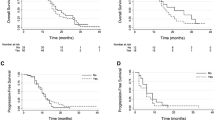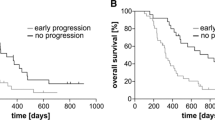Abstract
Background
We evaluated patterns of tumor growth in patients with newly diagnosed MGMT-non-methylated glioblastoma who were assigned to undergo radiotherapy in conjunction with bevacizumab/irinotecan (BEV/IRI) or standard temozolomide (TMZ) within the randomized phase II GLARIUS trial.
Methods
In 142 patients (94 BEV/IRI, 48 TMZ), we reviewed magnetic resonance imaging scans at baseline and first tumor recurrence. Based on contrast-enhanced T1-weighted and fluid-attenuated inversion recovery images, we assessed tumor growth patterns and tumor invasiveness. Tumor growth patterns were classified as either multifocal or local at baseline and recurrence; at first recurrence, we additionally assessed whether distant lesions appeared. Invasiveness was determined as either diffuse or non-diffuse. Associations with treatment arms were calculated using Fisher’s exact test.
Results
At baseline, 115 of 142 evaluable patients (81%) had a locally confined tumor. Between treatment arms, there was no significant difference in the fraction of tumors that changed from an initially local tumor growth pattern to a multifocal pattern (12 and 13%, p = 0.55). Distant lesions appeared in 17% (BEV/IRI) and 13% (TMZ) of patients (p = 0.69). 15% of patients in the BEV/IRI arm and 8% in the TMZ arm developed a diffuse growth pattern from an initially non-diffuse pattern (p = 0.42).
Conclusions
The tumor growth and invasiveness patterns do not differ between BEV/IRI and TMZ-treated MGMT-non-methylated glioblastoma patients in the GLARIUS trial. BEV/IRI was not associated with an increased rate of multifocal, distant, or highly invasive tumors at the time of recurrence.



Similar content being viewed by others
References
Berkman RA, Merrill MJ, Reinhold WC et al (1993) Expression of the vascular permeability factor/vascular endothelial growth factor gene in central nervous system neoplasms. J Clin Invest 91:153–159
Chinot OL, Wick W, Mason W et al (2014) Bevacizumab plus radiotherapy-temozolomide for newly diagnosed glioblastoma. New Engl J Med 370:709–722
Claes A, Idema AJ, Wesseling P (2007) Diffuse glioma growth: a guerilla war. Acta Neuropathol 114:443–458
Friedman HS, Prados MD, Wen PY et al (2009) Bevacizumab alone and in combination with irinotecan in recurrent glioblastoma. J Clin Oncol 27:4733–4740
Gilbert MR, Dignam JJ, Armstrong TS et al (2014) A randomized trial of bevacizumab for newly diagnosed glioblastoma. N Engl J Med 370:699–708
Herrlinger U, Schafer N, Steinbach JP et al (2016) Bevacizumab plus irinotecan versus temozolomide in newly diagnosed O6-methylguanine-DNA methyltransferase nonmethylated glioblastoma: the randomized GLARIUS trial. J Clin Oncol 34:1611–1619
Iwamoto FM, Abrey LE, Beal K et al (2009) Patterns of relapse and prognosis after bevacizumab failure in recurrent glioblastoma. Neurology 73:1200–1206
Kunkel P, Ulbricht U, Bohlen P et al (2001) Inhibition of glioma angiogenesis and growth in vivo by systemic treatment with a monoclonal antibody against vascular endothelial growth factor receptor-2. Cancer Res 61:6624–6628
Lamszus K, Brockmann MA, Eckerich C et al (2005) Inhibition of glioblastoma angiogenesis and invasion by combined treatments directed against vascular endothelial growth factor receptor-2, epidermal growth factor receptor, and vascular endothelial-cadherin. Clin Cancer Res 11:4934–4940
Narayana A, Kelly P, Golfinos J et al (2009) Antiangiogenic therapy using bevacizumab in recurrent high-grade glioma: impact on local control and patient survival. J Neurosurg 110:173–180
Norden AD, Young GS, Setayesh K et al (2008) Bevacizumab for recurrent malignant gliomas: efficacy, toxicity, and patterns of recurrence. Neurology 70:779–787
Nowosielski M, Wiestler B, Goebel G et al (2014) Progression types after antiangiogenic therapy are related to outcome in recurrent glioblastoma. Neurology 82:1684–1692
Ostrom QT, Gittleman H, Liao P et al (2014) CBTRUS statistical report: primary brain and central nervous system tumors diagnosed in the United States in 2007–2011. Neuro Oncol 16(Suppl 4):iv1-63
Paez-Ribes M, Allen E, Hudock J et al (2009) Antiangiogenic therapy elicits malignant progression of tumors to increased local invasion and distant metastasis. Cancer Cell 15:220–231
Plate KH, Breier G, Weich HA, Risau W (1992) Vascular endothelial growth factor is a potential tumour angiogenesis factor in human gliomas in vivo. Nature 359:845–848
Pope WB, Xia Q, Paton VE et al (2011) Patterns of progression in patients with recurrent glioblastoma treated with bevacizumab. Neurology 76:432–437
Rubenstein JL, Kim J, Ozawa T et al (2000) Anti-VEGF antibody treatment of glioblastoma prolongs survival but results in increased vascular cooption. Neoplasia 2:306–314
Schaub C, Greschus S, Seifert M et al (2013) FLAIR-only progression in bevacizumab-treated relapsing glioblastoma does not predict short survival. Oncology 85:191–195
Stupp R, Hegi ME, Mason WP et al (2009) Effects of radiotherapy with concomitant and adjuvant temozolomide versus radiotherapy alone on survival in glioblastoma in a randomised phase III study: 5-year analysis of the EORTC-NCIC trial. Lancet Oncol 10:459–466
Vredenburgh JJ, Desjardins A, Herndon JE (2007) Bevacizumab plus irinotecan in recurrent glioblastoma multiforme. J Clin Oncol 25:4722–4729 nd, et al.
Wen PY, Kesari S (2008) Malignant gliomas in adults. N Engl J Med 359:492–507
Wick A, Dorner N, Schafer N et al (2011) Bevacizumab does not increase the risk of remote relapse in malignant glioma. Ann Neurol 69:586–592
Wick W, Chinot OL, Bendszus M et al (2016) Evaluation of pseudoprogression rates and tumor progression patterns in a phase III trial of bevacizumab plus radiotherapy/temozolomide for newly diagnosed glioblastoma. Neuro Oncol 18:1434–1441
Zuniga RM, Torcuator R, Jain R et al (2009) Efficacy, safety and patterns of response and recurrence in patients with recurrent high-grade gliomas treated with bevacizumab plus irinotecan. J Neurooncol 91:329–336
Funding
Christina Schaub, no relationship to disclose. Sied Kebir, no relationship to disclose. Nina Junold, no relationship to disclose. Elke Hattingen, no relationship to disclose. Niklas Schäfer, Honoraria: Roche Travel, Accommodations, Expenses: Roche. Joachim P. Steinbach, Honoraria: Medac. Consulting or Advisory Role: Roche, Mundipharma, Speakers’ Bureau: Medac. Research Funding: Merck, Travel, Accommodations, Expenses: Roche, Medac,. Astrid Weyerbrock. Research Funding: Roche Pharma AG, Expert Testimony: Roche Pharma AG. Peter Hau, Honoraria: Roche, Consulting or Advisory Role: Roche, BMS, Novocure, Speakers’ Bureau: Roche, Novocure, Medac. Travel, Accommodations, Expenses: Roche, Novocure, Medac. Roland Goldbrunner. Consulting or Advisory Role: Magforce, Roche. Travel, Accommodations, Expenses: Magforce, Roche. Michael Niessen, no relationship to disclose. Frederic Mack, Honoraria: Roche, Consulting or Advisory Role: Roche, Research Funding: Roche. Moritz Stuplich, no relationship to disclose. Theophilos Tzaridis, no relationship to disclose. Oliver Bähr, no relationship to disclose. Rolf-Dieter Kortmann, no relationship to disclose. Uwe Schlegel, Honoraria: Roche, GlaxoSmithKline, Medac, Consulting or Advisory Role: Roche, Travel, Accommodations, Expenses: Roche, GlaxoSmithKline, Medac. Friederike Schmidt-Graf, no relationship to disclose. Veit Rohde, no relationship to disclose. Christian Braun, no relationship to disclose. Mathias Hänel, no relationship to disclose. Michael Sabel, no relationship to disclose. Rüdiger Gerlach. Honoraria: CSL Behring, Bayer, Medtronic. Consulting or Advisory Role: Bayer. Dietmar Krex Honoraria: Northwest Biotherapeutics. Consulting or Advisory Role: Baxter. Consulting or Advisory Role: Novocure. Claus Belka, no relationship to disclose Hartmut Vatter, no relationship to disclose. Martin Proescholdt. Employment: Roche, Consulting or Advisory Role: Roche Pharma AG. Travel, Accommodations, Expenses: Roche, Ulrich Herrlinger. Honoraria: Roche Pharma AG, Mundipharma. Consulting or Advisory Role: Roche Pharma AG, Mundipharma. Speakers’ Bureau: Roche Pharma AG, Mundipharma, Medac. Research Funding: Roche Pharma AG, Medac. Travel, Accommodations, Expenses: Roche Pharma AG. Martin Glas. Honoraria: Roche Pharma AG, Mundipharma. Consulting or Advisory Role: Novartis AG, Roche Pharma AG, Mundipharma. Travel, Accommodations, Expenses: Medac.
Author information
Authors and Affiliations
Contributions
CS acquisition of data, analysis and interpretation of data, manuscript writing. SK cquisition of data, analysis and interpretation of data, manuscript writing. NJ acquisition of data, analysis and interpretation of data. EH acquisition of data, analysis and interpretation of data, critical manuscript revision. NS cquisition of data, analysis and interpretation of data, critical manuscript revision. JPS acquisition of data, analysis and interpretation of data, critical manuscript revision. AW acquisition of data, analysis and interpretation of data, critical manuscript revision. PH acquisition of data, analysis and interpretation of data, critical manuscript revision. RG acquisition of data, analysis and interpretation of data, critical manuscript revision. MN acquisition of data, analysis and interpretation of data, critical manuscript revision. FM acquisition of data, analysis and interpretation of data, critical manuscript revision. MS acquisition of data, analysis and interpretation of data, critical manuscript revision. TT acquisition of data, analysis and interpretation of data, critical manuscript revision. OB acquisition of data, analysis and interpretation of data, critical manuscript revision. RDK acquisition of data, analysis and interpretation of data, critical manuscript revision. US acquisition of data, analysis and interpretation of data, critical manuscript revision. FSG acquisition of data, analysis and interpretation of data, critical manuscript revision. VR acquisition of data, analysis and interpretation of data, critical manuscript revision. CB acquisition of data, analysis and interpretation of data, critical manuscript revision. MH acquisition of data, analysis and interpretation of data, critical manuscript revision. MS acquisition of data, analysis and interpretation of data, critical manuscript revision. RG acquisition of data, analysis and interpretation of data, critical manuscript revision. DK acquisition of data, analysis and interpretation of data, critical manuscript revision. CB acquisition of data, analysis and interpretation of data, critical manuscript revision. HV acquisition of data, analysis and interpretation of data, critical manuscript revision. MP acquisition of data, analysis and interpretation of data, critical manuscript revision. UH acquisition of data, analysis and interpretation of data, critical manuscript revision, study concept and design. MG acquisition of data, analysis and interpretation of data, critical manuscript revision, study concept and design.
Corresponding author
Ethics declarations
Conflict of interest
Ulrich Herrlinger has served as a consultant for Roche, Novocure, Mundipharma, Noxxon and Bristol-Myers-Squibb. He has received a scientific grant from Roche and speakers honoraria from Roche, Medac, and Riemser Pharma. Martin Glas has served as a consultant for Roche, Novartis, Mundipharma, sigma tau and UCB Corporation. He has received speakers honoraria from Roche, Medac and sigma tau, and a scientific grant from Medac. Niklas Schäfer received honoraria from Roche. All other authors declare that they have no conflict of interest.
Ethical approval
GLARIUS was a randomized, controlled, unblinded, phase II trial (EudraCT No. 2009010390-21; ClinicalTrials.gov NCT00967330) approved by ethic committees of all participating centers. All patients gave written informed consent. All trial procedures adhered to the Declaration of Helsinki and the Guidelines of Good Clinical Practice. An independent data monitoring and safety board constantly reviewed all safety-relevant information.The trial was funded by Roche Pharmaceuticals. Data collection was performed by an independent clinical research organization funded by Roche. The principal investigator (U.H.) had full access to the data, reviewed all data, and had the final responsibility for manuscript submission.
Statement of translational relevance
There is conflicting data as to whether angiogenesis inhibitors such as bevacizumab induce more distant and/or invasive recurrent tumors as compared to alkylating standard chemotherapy in malignant glioma. In recurrent glioblastoma, a radiographically determined increase in distant and infiltrative growth pattern has been linked to bevacizumab treatment. However, almost all these data stem from uncontrolled retrospective observations after failure of standard alkylating chemotherapy with temozolomide. Given bevacizumab treatment has become a standard in the recurrence scenario, it is important to shed light on this issue. To this end, we assessed the tumor growth patterns at first recurrence of patients in the GLARIUS trial, a randomized phase II trial comparing treatment with bevacizumab/irinotecan vs standard temozolomide in MGMT-non-methylated glioblastoma. We show that recurrence patterns (invasiveness and tumor growth) are similar in both groups, thus not supporting the hypothesis of a bevacizumab induced invasive or distant tumor recurrence phenotype.
Rights and permissions
About this article
Cite this article
Schaub, C., Kebir, S., Junold, N. et al. Tumor growth patterns of MGMT-non-methylated glioblastoma in the randomized GLARIUS trial. J Cancer Res Clin Oncol 144, 1581–1589 (2018). https://doi.org/10.1007/s00432-018-2671-z
Received:
Accepted:
Published:
Issue Date:
DOI: https://doi.org/10.1007/s00432-018-2671-z




